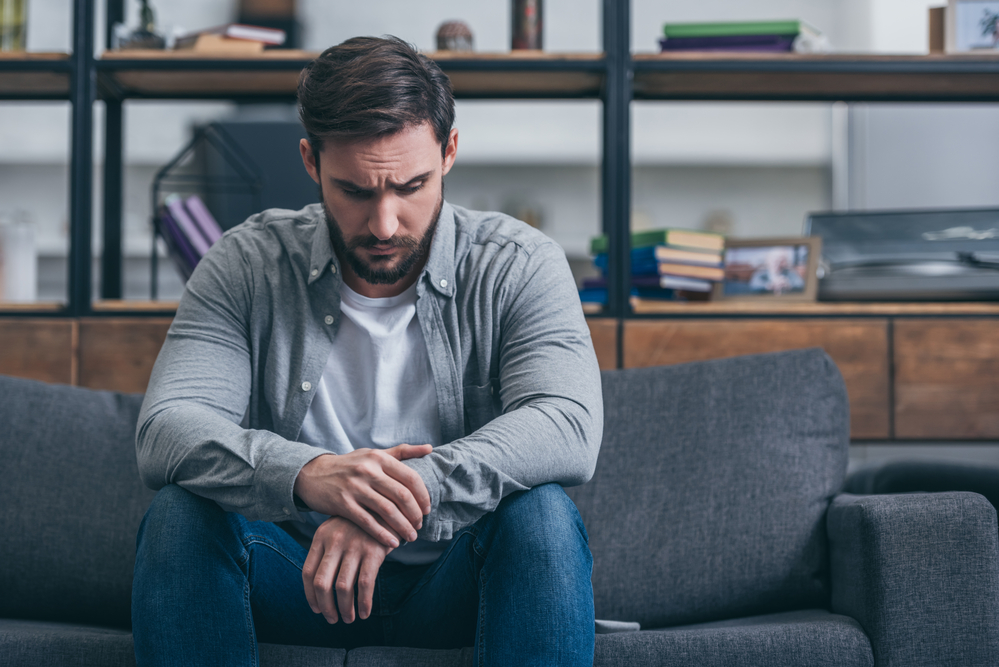It’s critical to recognize the signs and symptoms of postpartum depression in men after giving birth. The birth of a newborn should be a happy occasion, but sometimes it is intolerable because of the side effects. This is not restricted to mothers alone. Men also experience postpartum depression.

Can Men Get Postpartum Depression?
Postpartum depression is the depression experienced after childbirth. This is commonly attributed to the mums alone because society expects a man to bottle in his emotions. But yes, postpartum depression in dads is real.
It is more common than expected by society and it is not just a mere feeling that can be gotten over easily when it happens. New dads are more predisposed to experience postpartum depression being their first time having to accept a new member aside from their partners.
Men’s postpartum depression affects approximately 10% of new dads. Although it is not commonly talked about like women’s postpartum depression, PPD in men is not uncommon and most times, the onset is gradual which also explains why it is not always screened.
Causes Of PPD In Men
There are possible causes as to why postpartum depression happens in men. Below are a few of the possible explanations for PPD in men:
Testosterone Level
Hormonal changes in men have been attributed to a major cause of postpartum depression in dads. Men are prone to lower levels of testosterone as a result of childbirth stress. Other hormones that are prone to changes in men as new dads are cortisol, vasopressin, and the prolactin hormone.
Overwhelming Feeling
Being a new dad comes with a lot of stress and this may overwhelm the dad, especially a first-time dad. This can lead to postpartum depression in dads.
Age
Being a father at a young age comes with little or no experience, especially for first-time dads who have little or no experience with parenting before the birth of their newborn.
Increase Pressure
As a new father, there is pressure to provide more especially financially and emotionally for the newborn and the mother. A lot of PPD in men has been attributed to this intense pressure.
Lack Of Experience
A lot of the new dads are just not getting it. Even though they want to help with care and intimacy with the newborn, they have zero knowledge on how best to be present for both the mother and the child.
History Of Mental Illness
PPD in men is common also among dads with a history of mental illness. Either a personal history or a family history. This means the father is at risk of easily tilting towards depression or even anxiety as a result of the initial brain insult.
Sleep Deprivation
When a healthy individual is deprived of sleep for a long time, they manifest signs of depression which is a result of the neurochemical imbalances going on in the brain at the time.
Clinical Manifestations Of Postpartum Depression In Dads
Low mood
Dads with PPD most often experience feelings of sadness and hopelessness and mood swings.
Withdrawal
Postpartum depression comes with withdrawal from friends and family. At times, they get withdrawn from the newborn and the mother as well.
Work rate
PPD in men suddenly makes them increase their work rate. They work almost all the time, diverting all their energy to their work.
Anger
Dads with postpartum depression get angry over issues. They are also irritable and aggressive.
Others
The nonspecific postpartum depression symptoms for both genders are:
- l Loss of appetite
- l Inability to sleep or short sleep
- l Guilt
- l Weight loss
- l Confusion
- l Slow memory
- l Suicidal thoughts
- l Unexplained body pains.
Difference In Postpartum Depression In Men From Postpartum Depression In Women
Men with Postpartum depression is less common compared to women. About 10% of men experience postpartum depression while it is up to 12% in mommies.
Postpartum depression in women often occurs within the first six weeks of delivery but in men, the onset is gradual and goes up to three months postpartum before it starts manifesting.
Also, men with postpartum depression have a high tendency of abusing substances. PPD in men also makes men violent and in most cases, women with postpartum depression do not manifest these signs.

How To Ease Postpartum Depression In Dads
Sadly, a lot of men do not admit that they need help and support even if they agree that postpartum depression exists. Below are tips to help ease PPD in men.
Lifestyle changes
This includes adequate rest, a good diet, and exercise. These tips will help to relieve PPD in men.
Therapy
These include psychotherapy and cognitive behavioral therapy. The doctor may also recommend couples therapy if need be.
Support group
The support group is similar to talking therapy. It is a group of individuals with similar experiences coming together to discuss their coping mechanisms and tools that helped them pull through.
Avoid alcohol
Men with postpartum depression should avoid taking alcohol and drugs and get involved in activities that interest them
Take a break
Parenting is a big task and it comes with ups and downs. The stress is much and so, men must manifest signs of postpartum depression, take a break when needed, and continue.
The Use Of Medications In the Treatment Of Postpartum Disorder In Men
The treatment for postpartum depression in men is the same as treating clinical depression. The commonly used antidepressant is the selective serotonin reuptake inhibitor.
These medications and other ones the doctor will prescribe can be used in the treatment of men with postpartum depression.
Depending on how severe postpartum depression is, one or a combination of the above can be used. Therefore, it is safe to say that medication is involved in the treatment of PPD.
Men might not feel the physical anguish of childbirth or require physical healing, but having a new child means enormous changes in one’s life. Like mothers, fathers must take care of themselves mentally and physically.
It may be a consequence of several factors, including stress and exhaustion.
Asking for help does not make a man helpless. Can men have postpartum depression? Yes, and it can go on for a long time if mismanaged but it is easily treatable. It is important to talk to a specialist as soon as you notice any of the symptoms of PDD.



